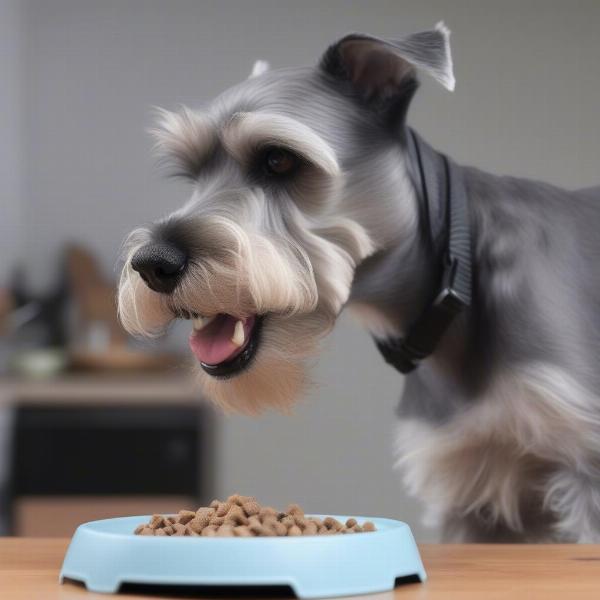Choosing the right schnauzer dog food can significantly impact your furry friend’s health and well-being. Whether you have a Miniature Schnauzer, Standard Schnauzer, or Giant Schnauzer, understanding their specific nutritional needs is crucial for a long, happy, and active life. This guide explores everything you need to know about schnauzer dog food, from choosing the right kibble to addressing common dietary concerns.
Nutritional Needs of Schnauzers
Schnauzers are energetic and intelligent dogs, and their dietary needs reflect their active lifestyle. A balanced diet for a Schnauzer should include high-quality protein for muscle development and maintenance, healthy fats for energy and coat health, carbohydrates for sustained energy, and essential vitamins and minerals for overall well-being. Specific nutritional requirements may vary slightly depending on the Schnauzer’s age, size, and activity level. Puppies, for example, require a higher calorie intake for growth, while senior dogs may benefit from a formula with added joint support.
 Miniature Schnauzer Enjoying Kibble
Miniature Schnauzer Enjoying Kibble
Choosing the Best Schnauzer Dog Food
With so many dog food options available, selecting the right one for your Schnauzer can be overwhelming. Look for a food that meets the Association of American Feed Control Officials (AAFCO) standards and is formulated for your Schnauzer’s life stage. Consider factors like breed size, activity level, and any existing health conditions. Reading dog food labels carefully and understanding the ingredients is vital. Prioritize foods with whole meat sources as the primary ingredient, avoiding fillers like corn, wheat, and soy.
Common Dietary Concerns in Schnauzers
Schnauzers can be prone to certain health issues, including pancreatitis and bladder stones. Choosing a dog food that addresses these concerns is crucial. For pancreatitis, opt for low-fat formulas, while for bladder stones, consider a food that helps manage urine pH levels. Always consult your veterinarian if you suspect your Schnauzer has a food allergy or intolerance. They can help identify the culprit and recommend an appropriate diet.
Feeding Schedule and Portion Control
Establishing a regular feeding schedule and controlling portion sizes are essential for maintaining a healthy weight for your Schnauzer. Puppies require more frequent meals than adult dogs. Consult your veterinarian or a canine nutritionist for personalized feeding recommendations based on your Schnauzer’s individual needs. Overfeeding can lead to obesity, while underfeeding can result in malnutrition.
Homemade Schnauzer Dog Food
Some Schnauzer owners prefer to prepare homemade meals for their dogs. While this can offer control over ingredients, it’s crucial to ensure the diet is nutritionally balanced. Consult with a veterinary nutritionist to create a recipe that meets your Schnauzer’s specific needs.
What Food is Best for a Miniature Schnauzer?
Miniature Schnauzers have similar nutritional needs to their larger counterparts but may require smaller kibble sizes. High-quality protein, healthy fats, and complex carbohydrates are essential for their overall health.
What Should I Feed My Senior Schnauzer?
Senior Schnauzers may benefit from a diet that is lower in calories and higher in fiber to support digestion. Joint supplements can also be beneficial in maintaining mobility.
Conclusion
Choosing the right schnauzer dog food is an investment in your dog’s health and longevity. By understanding their specific nutritional needs and considering factors like age, activity level, and potential health concerns, you can ensure your Schnauzer thrives. Remember to consult your veterinarian for personalized advice.
FAQ
- What are the best dog food brands for Schnauzers? While specific brand recommendations may vary, look for brands that prioritize high-quality ingredients, meet AAFCO standards, and cater to your Schnauzer’s life stage.
- Can Schnauzers eat grain-free dog food? While some Schnauzers can tolerate grain-free diets, it’s essential to discuss this with your vet, as some grain-free formulas have been linked to heart issues in dogs.
- How much should I feed my Schnauzer puppy? Feeding guidelines vary depending on the puppy’s age and weight. Consult your vet or the food packaging for specific recommendations.
- What are the signs of a food allergy in a Schnauzer? Common signs of food allergies include skin irritations, itching, digestive problems, and ear infections.
- Can I give my Schnauzer human food? While some human foods are safe for dogs, others can be toxic. Stick to dog food formulated for their specific needs.
- How often should I feed my adult Schnauzer? Most adult Schnauzers do well with two meals per day.
- What should I do if my Schnauzer is overweight? Consult your veterinarian to create a weight management plan that includes dietary adjustments and increased exercise.
ILM Dog is your go-to resource for expert advice on dog care and nutrition. We offer valuable information on dog breeds, health, training, and much more. From choosing the right food for your Schnauzer to understanding their specific needs, ILM Dog is committed to providing you with the knowledge and resources you need to ensure your canine companion’s well-being. Contact us at [email protected] or +44 20-3965-8624 for personalized assistance.